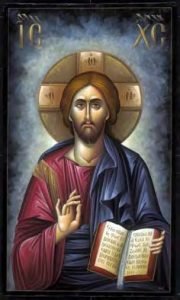 One can truly say that the WORD OF GOD has sacramental power. We believe that as the Old Covenant drew to a close, in order to make possible a new and deeper relationship of love between God and man, the Spirit of prophecy withdrew from Israel. This prompted rabbis to explain the ensuing silence as a sign of divine wrath and consequent judgment. Ignatius, with the whole of Christendom, interprets this crucial moment in Israel’s history as a preclude to the “fullness of time,” when God will once again “speak out of silence” to utter the promise of a new creation through the person and teaching of His incarnate Word. This is Ignatius of Antioch (c. 35 – c. 108), is
One can truly say that the WORD OF GOD has sacramental power. We believe that as the Old Covenant drew to a close, in order to make possible a new and deeper relationship of love between God and man, the Spirit of prophecy withdrew from Israel. This prompted rabbis to explain the ensuing silence as a sign of divine wrath and consequent judgment. Ignatius, with the whole of Christendom, interprets this crucial moment in Israel’s history as a preclude to the “fullness of time,” when God will once again “speak out of silence” to utter the promise of a new creation through the person and teaching of His incarnate Word. This is Ignatius of Antioch (c. 35 – c. 108), is
also known as Ignatius Theophorus (Ιγνάτιος ὁ Θεοφόρος, “the God-bearing”), Ignatius Nurono (“The fire-bearer”) was an Apostolic Father, student of the Apostle John, and the third bishop of Antioch. En route to Rome, where according to Christian tradition he met his martyrdom, he wrote a series of letters which have been preserved as an example of very early Christian theology.
This new and final creative act the apostle calls a “mysterion,” a “sacrament” hidden in God from before all time, but now revealed and accomplished in the person of the divine Logos, the crucified and risen Son of God. The purpose of this sacramental act, like the original work of creation, is to call mankind “from nothingness into being,” from a non-being of man’s own making into a radically new existence bestowed by grace, from fragmentation and hostility into reconciliation and unity, an eternal participation in the very life of God. To accomplish this “sacrament,” which is nothing less than the divine economy of universal salvation, the divine Word summons and introduces humanity into a new order of reality, the eternal life of the Kingdom. There He brings His saving work to fulfillment by submitting Himself, with all of creation, to God the Father.
This, I know, is rather dense thought. We don’t normally tend to look at the New Testament in this way. Just as the Old Testament formed the foundation for the Old Covenant – the agreement between God and man – so the New Testament, which God, though His Spirit inspired certain men to write – is the foundation for the New Covenant between God and man. Just as the Ten Commandments showed men how to live, so the Gospels show us how to live in accord with the very Spirit of God.
